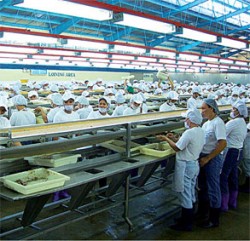- Home
- |
- About Us
- |
- Working Groups
- |
- News
- |
- Rankings
- WEF-Global Competitiveness Report
- Ease of Doing Business Report
- IMD-World Competitiveness Yearbook
- TI-Corruption Perceptions Index
- HF-Economic Freedom Index
- WEF-Global Information Technology Report
- WEF-Travel and Tourism Report
- WIPO-Global Innovation Index
- WB-Logistics Performance Index
- FFP-Fragile States Index
- WEF-Global Enabling Trade Report
- WEF-Global Gender Gap Report
- Gallery
- |
- Downloads
- |
- Contact Us
Cheaper to do business in PH

The Philippines is becoming increasingly competitive as an investment destination both in manufacturing and services in terms of cost, competency and availability of labor as well as in rentals and land cost among its peers in Asia, the results of a survey conducted by the Japan External Trade Organization (JETRO) in Manila show.
Trade Undersecretary Cristino Panlilio, who shared the results of the survey, said the Philippines is the cheapest in almost all factors of business or investment decision-making as measured in the report.
"The implication of this is that we are now, even in Asia, very competitive. We are cost-competitive when it comes to three factors of business or investment decision-making. We provide the least cost in terms of rentals or acquisition of land, availability of labor and compensation cost of labor. Also in terms of quality, we are top," Panlilio said.
The survey, which covered Japanese-affiliated firms in Asia and Oceania in August to September 2011, shows the Philippines garnered favorable ratings in terms of competitiveness advantage on business environment in comparison to other Asian countries.
Competitiveness indicators included financial costs, sufficient labor supply and reasonable salary (for manufacturing and non-manufacturing personnel).
The survey covered a cross section of Asia: China, Malaysia Thailand, Vietnam, India, Indonesia, Myanmar and the Philippines.
The survey did not include the developed economies in Asia like Japan, South Korea, Taiwan and Singapore.
Panlilio said the Philippines has the cheapest in terms of rentals and land prices.
The survey shows when it comes to problems on increasing financial costs, the Philippines, had the lowest percentage rating of 4.6 percent while China had 64.1 percent.
The report also said shortage of land/offices, rising land pries/rental is not a major problem in the Philippines with a rating of 5.8 percent, which is far lower than the 32 percent rating of India, the highest.
Panlilio said in payroll costs, the Philippines is also the cheapest while in sufficiency of labor supply for general staff, the country is the most plentiful.
On problems in skyrocketing payroll costs, the Philippines had the lowest rating of 18.2 percent with Vietnam having the highest at 61.3 percent. Malaysia was the second lowest with 27.5 percent.
JETRO also said the Philippines had the lowest rating of 3.2 percent followed by India, 4.2 percent, and Indonesia, 4.4 percent, in terms of difficulty in recruiting general staff.
This means there is a large pool of general staff who multinational corporations can recruit or hire.
Panlilio said the same could be said of hiring executives.
"When it comes to recruiting executives, we are the second most available after Malaysia," he said.
On difficulty in recruiting executives, Malaysia had the lowest rating of 37.9 percent followed by the Philippines at 39 percent. Myanmar had the highest rating of 64.3 percent.
Panlilio said a terms of employment retention, the Philippines has the best loyalty record while in terms of worker competency, it has the least problem.
The country also has the least difficulty maintaining quality control.
On the low rate of workers’ employment retention, the Philippines had a rating of 30.6 percent, the lowest among ratings of Asian countries.
The Philippines boasts of a highly competent and English-proficient labor force. Thus the rating of 37.9 percent, the lowest, which means the country does not have a major problem when it comes to workers’ competency, with Myanmar having the highest percentage when it comes to problems on workers’ competency.
For manufacturing, when it comes to difficulty in quality control, the Philippine rating of 26.7 percent is the lowest so far among Asian countries.
In terms of annual salary for manufacturing staff, the Philippines is the third cheapest; manufacturing engineers, the second cheapest, and for manufacturing managers, third cheapest, Panlilio said.
In terms of non-manufacturing staff salary, the third cheapest, and for non-manufacturing (services) managers, the second cheapest.
For the indicator salary base-up rate 2011-2012, the Philippines had 5.3 percent rating, second to Malaysia, with a rating of 4.5 percent. Vietnam had the highest rating of 17.1 percent.
On annual salary (including bonuses, allowances, social security, etc), for manufacturing staff, the Philippines ranked third from the lowest, giving an annual salary of $4,048. On annual salary for manufacturing engineers, again, Vietnam’s annual salary of $4,793 was the lowest, followed by the Philippines at $6,494. On annual salary for manufacturing managers, still Vietnam’s annual salary of $11,526 was the lowest at $5,199, again followed by Indonesia and the Philippines at $6,852 and $7,324, respectively.
On annual salary for non-manufacturing managers, again Vietnam pays the lowest annual salary of $14,977, followed by the Philippines and Indonesia at $19,187 and $23,068, respectively.
The government notes the strong connection between a country’s ranking and its ability to attract investments, raise its per capita GDP ad create jobs and wealth.
"The results of the JETRO report proves that the Philippines continues to be a good investment destination not only for manufacturing sector, but for other sectors as well given the initiatives currently being undertaken the Aquino administration to achieve our goal of a competitive Philippines with growth that is inclusive," Panlilio said.
original source: www.malaya.com.ph

